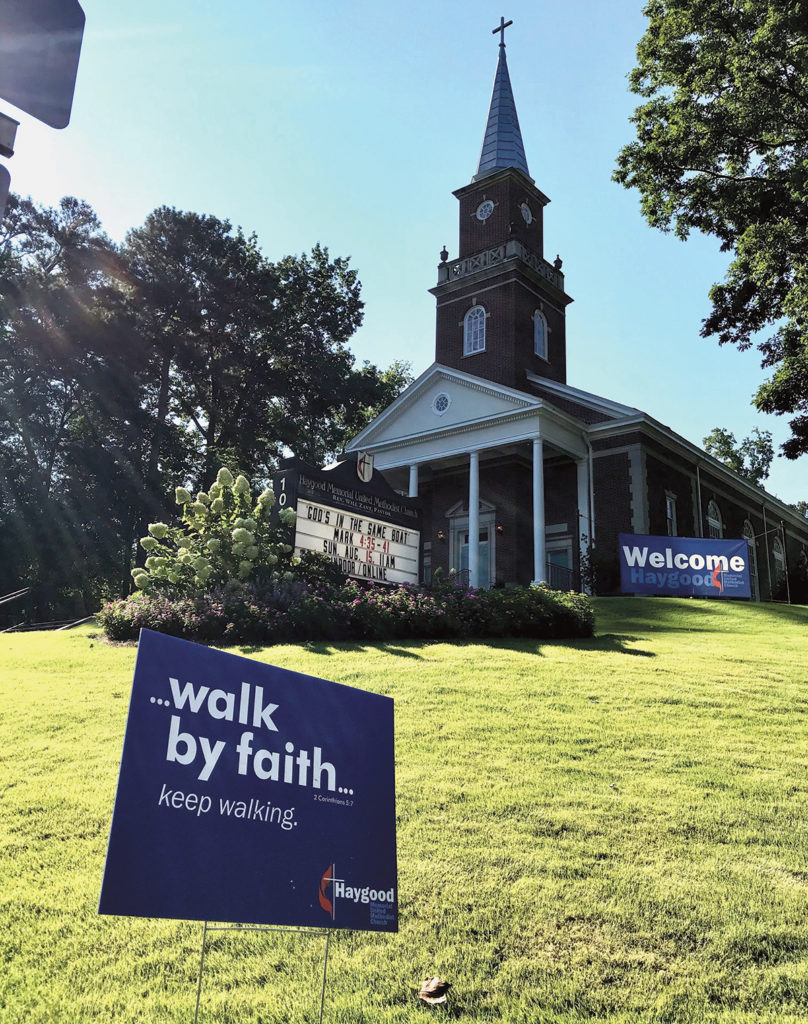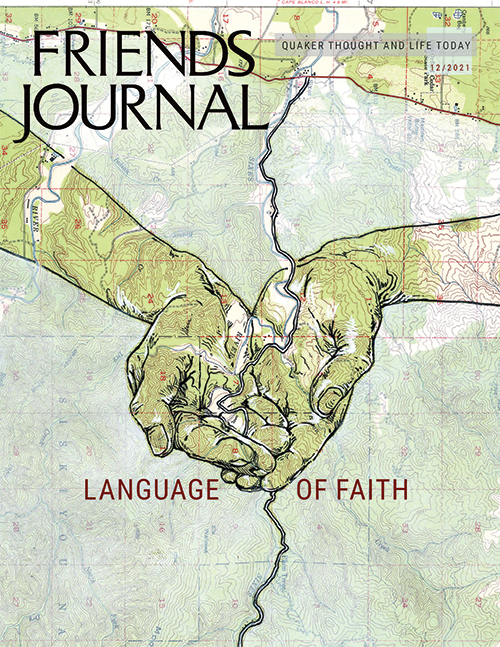Finding My Way Toward Right Use of Scripture
This past summer a yard sign, “Walk by faith . . . keep walking,” was placed on the lawn of a Methodist church that I often walk by. It was new, an addition to a large, permanent sign on the corner that had the sermon topic and Scripture reference for the week. The same yard sign was on the lawns of several houses in the neighborhood, and I was glad to see that members of the church were united in spreading this message of hope.
Like this Methodist church, many Protestant churches announce the sermon topic of the week and give a verse of Scripture on a large, permanent sign that can be easily seen from the road. I enjoy seeing them and considering this form of outreach to their members, and especially to those who are not already a part of their faith community. Sometimes they inspire me and prompt reflection, and occasionally, they offer much needed humor. Two of my favorites are: “Sinners make the best Saints!” and “Looking for a sign from God? Here it is!”
The yard sign and the larger church signs prompted me to think about how people of all faiths speak and write publicly about faith. How do we use the Bible to describe our faith? Do our messages about faith offer inspiration, invite understanding and dialogue? Do we invite others into our house of worship as a safe place for refuge in times of loss and grief?
“Walk by faith . . . keep walking” was just the message I needed the first time I saw it, and it stayed on my mind. I felt directly spoken to by God. It offered inspiration and encouragement, and I sent the words to family and friends. At our meeting in Atlanta, Georgia, I also offered this message after our meeting for worship, as we shared joys. It was during August of this year, when the Delta variant was increasing the number of people dying from COVID-19 and of children filling hospitals. We were all wondering where we could find the strength and courage to go on. Here was an answer.
When I stopped later to take a picture of the sign, I saw the Scripture reference in much smaller font: “‘Walk by faith . . .’ (2 Cor. 5:7) keep walking.” The verse in the King James Bible is “For we walk by faith, not by sight.” Those three words, “not by sight,” made the verse much more powerful, defining faith as action depending on and trusting God’s guidance. The words also spoke to the current, pervasive feeling that we are walking as though blindfolded in this pandemic, groping in the dark for direction. As I reflected on the verse, I remembered other messages about faith in both the Old and New Testaments that describe faith as a lifelong walk directed by God. Micah 6:8 is a favorite because it gives three clear directions: “what does the Lord require of thee, but to do justly, and to love mercy, and to walk humbly with thy God?” This verse came to me as a message I offered in worship. I realized that I had been more concerned with how to work for justice and mercy than with how to walk humbly with God, and that this is the hardest challenge—the one that I need to do in order to do everything else.

Photo courtesy of the author
Bible Lessons
Bible verses and hymns often come to me in worship, sometimes as a comfort, sometimes as a challenge. The stories and Scripture of the King James Version of the Bible was the language of faith that I learned as a child. In the nursery of West Asheville Baptist Church from infancy to age five, I heard that “God is love” (1 John 4:16). It was however much more important that the caregiver, Lottie Robinson, was always there, offering her gentle care and making me and each child know that we were a beloved child of God. The way she lived the message made me look forward to being there every Sunday and feeling loved. Learning the language of the Bible included reading the stories of the Old and New Testaments, and memorizing Bible verses and the books of the Bible, always in the King James Version. We were taught that the Bible is our sword and shield against evil, and we competed in Bible “sword drills” to see who could find a Scripture verse first. I also saw that there were many people in my church family like Lottie, who could quote Scripture but lived their faith following the example of Jesus, offering open arms of acceptance and love to all. And I saw that some in our church used the Bible as a sword to defend our faith and preach against others.
As I grew older, I saw more examples of faith and the institution of the church using the messages of the Bible to exclude and divide communities. My friend Becky attended the Catholic church across the street from our church. She told me that her priest said the Catholic faith was the only true faith and true church. In high school, my best friends were Jewish, and I began to learn from them how our religions divide us. We were in a debate club and enjoyed talking about how our rabbis and preachers could use the same Scriptures to say we were each God’s chosen. Our club meetings always opened with a member offering a prayer, and I realized when I was called on to offer the prayer that I was the only Christian present. I prayed the words of Psalm 19:14: “Let the words of my mouth, and the meditation of my heart, be acceptable in thy sight, O LORD, my strength, and my redeemer.” I was grateful that I could recall a verse that united us.
I was reminded of the discussions with my Jewish friends when I read The Battle for God. In that book, Karen Armstrong describes how Muslims, Christians, and Jews teach their followers to believe in a “tribal” God, one who is on their side, and to use the Bible and other Scriptures to support their faith. I understood how religions used faith throughout history to literally battle for God and to do a great deal of harm.
Like the verse, “Walk by faith,” [my father] taught that faith is active, a lived experience, and is more about what I do than what I say.
Faith Lived
I am grateful that my father was a lay minister and Sunday school teacher who offered guidance that went beyond the Bible. He was one of the leaders in our church who believed Jesus came to teach us how to live our faith. He helped me understand that the Bible stories and their instructions were written in a specific place and time, based on the writers’ understanding of the message they were given, and that this is the challenge for each of us: to use Scripture as a guide to develop our own understanding of God and to work out our beliefs and continually seek God’s guidance for how to live and work. His life and teachings were much like those of Friends.
Like the verse “Walk by faith,” he taught that faith is active, a lived experience, and is more about what I do than what I say. In an interview, I heard William Sloane Coffin ask, “Are you using the power that you have to do what you say you believe?” This is still a question that I use to discern my work. I was drawn to the work of American Friends Service Committee (AFSC) in college, as I explored how to translate my faith into practice. An AFSC program gave me the opportunity to explore Quaker faith through a summer internship working at Sheppard and Enoch Pratt Hospital with mentally ill patients while I attended Stony Run Meeting in Baltimore, Maryland. I was drawn by the silence of meeting for worship without Scripture reading or sermon, but missed the organ music and hymn singing. My Baptist experience in Wednesday night prayer meetings prepared me for sitting silently in community asking God to help others with specific problems, as well as for my concerns. Our AFSC group lived as a small community in the nurses’ quarters of the hospital and was given a brief orientation to Quaker history and faith. We also held a mid-week silent worship. This experience was in 1967 and the beginning of my lifelong walk with faith as practiced in the unprogrammed tradition of Friends.
In 1981, the Friends General Conference Gathering was held at Berea College in Kentucky. A workshop, “George Fox and the Bible,” helped me understand how George Fox relied on the King James Version of the Bible to articulate his faith. We were guided in reading passages from The Journal of George Fox and then in finding his references to the Bible. My experience finding Scripture verses fast in my Baptist church’s “sword drills” led the class to discuss our experience with using the Bible. I learned that others like me were drawn to Friends by the emphasis on action, wanting to put aside the Bible because we were troubled by the way it had been used. Some in this workshop were learning for the first time that Fox’s journal and Quaker history were guided by the Bible and that Fox was also struggling with the right use of Scripture. In his journal, he wrote, “And I was to direct people to the Spirit that gave forth the Scriptures, by which they might be led to all Truth, and so up to Christ and God, as they had been who gave them forth.” This message in his journal reminded me of my father’s words encouraging me to be open to the Spirit’s guidance. It was wonderful to read how Fox studied and used messages from the Bible in his teaching, but more importantly how he tried to be “guided by the Spirit.” In this workshop, I discovered how my faith journey led me to Friends. With gratitude for guidance in the Scripture of the King James Version of the Bible, and the lived faith witness of my Baptist family and friends, I became better able to integrate my past faith tradition and Bible knowledge with my home now among Friends.
I’m grateful that the sign “Walk by faith . . . keep walking” is still at the church and at homes in my neighborhood, offering the support that I need now. The message helps me reflect on my faith, and challenges me to live my faith daily.




Thank you for this inspiring essay. Micah 6:8 has always been one of my favorites, too, and walking humbly with God has been a lifelong challenge. Those of us who do good works in the world particularly need to be reminded of the importance of this.
Thank you, George. Writing about my spiritual journey, especially wrestling with scripture was helpful to me and it is a special blessing to know that the message spoke to you. Mary Ann
Was KJV available in 1652? Didn’t early Friends have the Geneva Bible?
The King James version was available from 1611 onward, and James banned the further publication of the Geneva Bible at that point, although it was still in circulation, and early Quakers did have access to it.